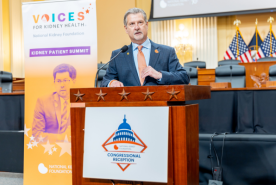June 21, 2023
At the recently held Congressional Black Caucus Foundation (CBCF) Policy for the People Health Summit, NKF staff discussed our kidney patient-focused legislative agenda, the Kidney Equity for All (KE4A) campaign, and how best to help patients of color with chronic kidney disease (CKD) contend with the health equity challenges that they frequently face.
Emphasizing Disparities in Care
Communities of color are disproportionately impacted by kidney disease largely due to several environmental and social factors that have influenced health outcomes for decades. These non-medical factors also known as the social determinants of health make up the conditions that include where you are born, live, work, play, and age that shape your quality of life.
Although Black/ African American people make up about 13% of the population, they account for 35% of the people with kidney failure in the United States. They also experience the highest rates of diabetes and high blood pressure, which are the two leading risk factors for CKD. Unmet social needs may make it harder for communities of color to be healthy and get the medical care and support they need.
These elements coupled with historical structural racism contribute to the inequities within the prevalence of CKD.
Disparities in kidney health not only affect how a patient gets diagnosed, instead, it impacts patients throughout the entire kidney patient journey from kidney care (prevention and treatment), to dialysis through transplantation.
- Chronic Kidney Disease (CKD): Race, inadequate access to quality healthcare, and environmental and social factors directly contribute to disparities in CKD screening, diagnosis, and, low rates of appropriate testing, and disease progression.
- End-Stage-Renal Disease (ESRD): Black Americans are approximately four times more likely to develop kidney failure.
- Kidney Transplantation: The average wait time for a kidney transplant is 5 years but can be as long as 10 years in some areas and race impacts access to a kidney transplant. Out of 90,000 Americans awaiting a transplant, only 24,670 received one in 2021, and about one-fourth of those came from living donors. While being four times more likely to develop kidney failure, Black Americans are less likely to get a lifesaving transplant. The use of a race-based kidney disease eGFR equation also potentially delays referral to transplantation and increases the wait time for a life-saving kidney transplant. Widespread adoption of the CKD-EPI race-free quotation will help ensure everyone who needs a transplant gets one.
Join the kidney community in calling for improved health equity.
Advocating for Change
[VIDEO::http://www.youtube.com/watch?v=F_seUpCS9Ck::aVideoStyle]
Staff in attendance shared information on several relevant pieces of legislation including the Living Donor Protection Act (LDPA), the Improving Access to Home Dialysis Act (IAHDA), and the Organ Transplantation Transparency, Accessibility, and Reform Act (OTTAR), all of which address key race-related issues in kidney care.
Summit attendees were also informed of NKF’s current research plan for expanded CKD screenings by the United States Preventive Services Task Force (USPSTF) which has excluded high-risk populations, such as individuals with diagnosed diabetes and hypertension. Stakeholders were urged to take action and encourage influential voluntary task forces, like the USPSTF, to align with the current scientific evidence supporting CKD screening for high-risk populations.
To tackle the racial disparities in awareness, diagnosis, and treatment of kidney disease, NKF is working to incorporate provisions that address the following key priorities:
- Eradicate racial and ethnic disparities in access to transplantation through our Transplant for All initiative.
- Enhance the diagnosis and treatment of Chronic Kidney Disease (CKD) to delay the onset of kidney failure. Read our comments on USPSTF here.
- Decrease out-of-pocket expenses for kidney patients.
Your Voice Makes All the Difference
Become a Voices for Kidney Health advocate and use your voice to urge Congress to make necessary changes that improve health equity. We can’t do it without you.











